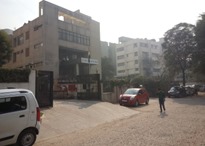Madras high court
In Sri Aurobindo Ashram Trust and Ors vs R Ramanathan and Ors, the Supreme Court bench comprising justices Madan B Lokur and SA Bobde, refused to intervene in the dispute between the Aurobindo Ashram Trust and the respondents over the former’s failure to take steps to seek confiscation of copies of the book, “The Lives of Sri Aurobindo” written by Peter Heehs.
The Madras high court stayed last month’s government order that had cancelled registration of NGO Greenpeace India, and observed that the Tamil Nadu Registrar of Societies (RoS) had failed to follow the principles of natural justice, reported Times of India.
According to the NGO, the court has granted an unconditional stay to the cancellation of it’s registration, which had happened for the sixth time in the last one and a half year as the NGO is being regularly targeted by various bodies. Legally India has covered various litigation matters of Greenpeace here, here and here.
Greenpeace India representative was quoted as saying, “We were confident the courts would agree that Greenpeace is on sound legal footing and has done nothing wrong, notwithstanding the government’s ridiculous allegations of fraud in this instance. Our accounts are an open book and on our website for all to inspect.”
Madras high court is set to break its own judicial vacancy record by March 2016, functioning at 40 less judges than its sanctioned strength of 75 judges, reported Times of India.
Madras, along side Delhi, is the fourth largest out of 24 Indian high courts, according to the Department of Justice.
The central government increased the sanctioned strength of judges in each high court by 25 per cent in February this year, and in Madras in the last two years while 10 judges have retired none have been appointed. Justice V M Velumani, on 21 December 2013, was the last judge to be sworn in at the court.
The high court had recalled 12 prospective judge names recommended by the collegium, in an unprecedented move in February 2014, after protest by lawyers, as then reported by Legally India.
Nine names were recommended, after that recall, by the current collegium.
The 24 high courts across the country have a sanctioned strength of 1,170 judges but they are working with about 60 percent of their sanctioned strength. There are 370 vacancies in the high courts.
The suspension of 20 more errant lawyers by the_Bar Council of Tamil Nadu and Puducherry_, as reported by the Times of India takes the toll of Madras lawyers suspended recently from practicing in any court or tribunal, to 35.
Among the latest 20 suspended advocates are 10 who laid siege to the court of Madras high court chief justice Sanjay Kishan Kaul on 14 September.
10 more lawyers of the court, not among the suspended 20, maybe awaiting action over their misbehaviour with the Central Industrial Security Force officers deployed at the court who, the lawyers claim, had filmed the frisking of a woman advocate.
The _Bar Council of India (BCI) _has reportedly said that following its September 2015 precedent of direct action against the lawyers if the state bar council fails to act stringently, it may again take direct action in the present case as well.
Lawyer _strike_s are illegal, said the Madras high court while refusing to set aside a proceeding against a man who had challenged the proceeding on the ground that it took place in the absence of his striking lawyer, reported PTI.
The high court’s Madurai bench of justices R Sudhakar and VM Velumani said: “The protest, if any, can be by giving press statement, TV interviews etc that could be given outside court. Even carrying placards, wearing black bands, banners, going on dharna, procession should be done outside and away from the court.”
The man had appealed to the high court to quash the 28 September disciplinary proceedings against him by a lower court on the ground that his lawyer was participating in a collective court boycott observed that day, and was not present to represent him in court.
The Madras high court used online messenger and video conferencing service Skype to conduct the legal proceedings in a case asking for police protection at a church wedding, reported The Firstpost.
Justice S Vaidyanathan of the Madras HC’s Madurai bench heard the Ramanathapuram district case at his residence, on the suggestion of the administrative Judge of the high court Justice V Ramasubramanian, due to the unavailability of judges at the station and because the petition for urgent hearing was filed at the last moment.
The judge directed the police to provide protection for the marriage ceremony after going through the case documents that were scanned and mailed to him for his perusal. The certified copy of the order directing the police to provide protection was mailed to the police at 8PM yesterday.
The court officials reportedly claimed that this was the first time in its history that the high court used Skype for hearing a case.
The police had objected to the marriage ceremony being performed at the church due to an existing dispute between the petitioner and the church authorities. The police had allegedly coercively obtained from the petitioner, an undertaking to perform the marriage in some other church.
Madras high court’s controversial Justice C S Karnan has filed long-leave application with the Madras high court to protest the allocation of “insignificant and dummy portfolio” of cases to him by Madras HC Chief Justice Sanjay Kishan Kaul, reported Business Standard.
In a letter to the Chief Justice he wrote: “It is with a heavy heart that I am desirous of proceeding on a long leave as a result of the harassment and belittlement meted out to me by you lordship and to ensure that the decorum of the court is maintained to the satisfaction of the general public.”
He also wrote letters to the Union Law Minister and the Principal Accountant-General in Chennai.
Justice Karnan said that the collegium system of appointment of judges was a doubtful system that promoted only high caste candidates and said it should be rooted out “lock, stock and barrel.”
In January this year, he had stormed into a court of Madras high court hearing petitions in the matter of appointment of judges at the court and initiated a suo motu writ petition against constitution of the collegium at the high court. This eventually led to Supreme Court taking over the matter.
The Tamil Nadu government has asked the Supreme Court for relief from a Madras high court order directing it to put in place Central police (CISF) security worth Rs 16.6 crore at the Madras high court, reported the Times of India.
Madras HC Chief Justice Kishan Kaul and Justice TS Sivagnanam had on 30 October ordered the state government to deposit Rs 16.6 crore, within a week, with the central government for deploying a 650-personnel CISF contingent at the high court for six months, and ordered that the new security protocol should be in place on 16 November.
The Tamil Nadu government told the Supreme Court that lawyers and police on the Madras high court have no bad blood ‘as on date’ and that the problem lies in the 29 October 2009 administrative order which requires state police to get a prior permit before deploying forces. The government said that this takes away the state police’ free hand to act during law and order disturbances on court campuses.
“Had the administrative restraint been lifted, the state police authority would be in a better position to give better security than any central force on the high court campus,” the Tamil Nadu chief secretary told the court, it was reported.
The Madras high court has been suffering from disruptions and disturbance due to rallies, demonstrations, occupation of chief justice’s court and ruckus by lawyers for a few months now. Chief Justice of India H L Dattu had also taken note of the disturbances in the HC and had remarked about the ‘fear psychosis in the court halls’. Bomb hoaxes have also been received by the high court in the last few months.
The state government is opposing any central force to take either full or a part of security arrangements in the high court and has told the Supreme Court “It is not open to the high court to take away the powers of the state and entrust it to the central security...It would amount to encroachment of the powers of the government by another wing of the State - Judiciary.”
“Further it was recorded that deployment of central force would lead to jurisdictional issues and consequent problems, and the introduction of central police force would worsen the prevailing situation due to non-familiarity of local language,” the SLP stated, it was reported.
The Supreme Court refused to stay the rules regarding the Certification of Practice (CoP) of the Bar Council of India (BCI) reported webindia.
A division bench of Justices Pinaki Chandra Ghosh and RK Agrawal were hearing transfer petition of BCI and declined to stay the CoP rules. The court had stayed the CoP rules in August.
The CoP rules require practicing lawyers to renew their registration with the bar council every five years. The deadline for the registration was extended to 31 December 2015 by the BCI following the orders of the court.
Senor advocate KK Venugopal was briefed by advocate Ardhendumauli Kumar Prasad for the BCI He argued in court that the number of fake lawyers was growing in the bar. Venugopal reportedly submitted that these advocates move freely in courts wearing robes and soon the situation in the Madras high court would be replicated everywhere else.
The Supreme Court allowed the BCI to continue the CoP rules but also reportedly warned it not to be prejudiced against lawyers not practicing in courts. The division bench adjourned the matter for further hearing without giving any next date, it was reported.
The Bar Council of India (BCI) is to continue functioning as per current procedure, as the BCI succeeded in its appeal against the Madras high court order that had suggested transferring its functions to an expert judicial body, reported The Hindu.
The Madras high court on Friday stayed its justice N Kirubakaran’s order in which he had given 14 radical recommendations including the transfer of BCI’s function to a body headed by a retired Supreme Court judge.
A bench of Chief Justice SK Kaul and justice TS Shivagnanam passed an interim stay on four of the 14 recommendations in justice Kirubakaran’s 6 October order.
Disciplinary proceedings set to begin today against 14 lawyers who were suspended by the Bar Council of India for creating disorder in Madras high court, have been stalled by the Madras high court, reported the Business Standard.
A bench of justices R Sudhakar and VM Velumani restrained the Special Disciplinary Committee (SDC) formed by the Bar Council of Tamil Nadu and Puducherry (BCTP) to hold an inquiry against the suspended lawyers who had allegedly stormed various courtrooms and shouted slogans against judges, as was reported by Legally India.
The bench was hearing advocate and petitioner-in-person M Mohammed Rafi’s plea seeking to move the displinary proceedings to Karnataka State Bar Council’s committee, as originally proposed by the BCI Rafi has alleged that initially, the BCI constituted a disciplinary committee consisting of members from the Karnataka Bar Council so that a fair and proper inquiry could be conducted. But following a “sly” request from the BCTP, the inquiry was transferred to it.
The petitioner claimed that the suspended lawyers have good relationship with the members of BCTP nominated by BCI to inquire against them, making the whole process a hogwash. The petitioner had reportedly made a representation to the BCI to transfer the inquiry to another state on 29 September citing open support to errant lawyers by lawyers of the BCPT, which was rejected.
The court has directed the Secretary of the BCTP, who constituted the disciplinary committee, the Chairman of the BCI and the SDC to give their views on the plea in Rafi’s petition.
Four judges of Madras high court have set an example for others by carpooling to the courts from their residence reported The Hindu. The practice, initially started by two judges in 2010 has now increased to four justices N Kirubakaran, M Sathyanarayanan, MM Sundresh and S Vaidyanathan travelling together everyday.
Kirubakaran was quoted as saying, “Travelling together helps us bust stress, especially after having a long day at work. All day, we listen to arguments and we need to unwind as well. Chatting with other judges helps us share interesting anecdotes during the hearing, and when we laugh together, our stress disappears, though we are travelling through heavy traffic. Besides, we help save fuel and money”
All the judges reside in same locality of Raja Annamalai Puram at their official residence.
 The Bar Council of India (BCI) will appeal the 6 October Madras high court order that suggested disbanding the BCI and replacing it with a body of experts as well as doing away with the three-year LLB degree.
The Bar Council of India (BCI) will appeal the 6 October Madras high court order that suggested disbanding the BCI and replacing it with a body of experts as well as doing away with the three-year LLB degree.
 Justice N Kirubakaran of the Madras high court passed radical directions on a petition asking the court to curb entry of persons with criminal antecedents into the legal profession and to maintain purity of law courses.
Justice N Kirubakaran of the Madras high court passed radical directions on a petition asking the court to curb entry of persons with criminal antecedents into the legal profession and to maintain purity of law courses.
 Unprecedented scenes; caused by fear of the bar.
Unprecedented scenes; caused by fear of the bar.
 The Bar Council of India (BCI) has suspended 15 lawyers who were allegedly involved in violence in the Madras high court, reported The Hindu and others.
The Bar Council of India (BCI) has suspended 15 lawyers who were allegedly involved in violence in the Madras high court, reported The Hindu and others.
 The Indian judiciary has been grappling with the question of whether to permit foreign lawyers to practice in India for more than two decades. After yesterday’s hearing in the Supreme Court, it doesn’t look like any end is in sight.
The Indian judiciary has been grappling with the question of whether to permit foreign lawyers to practice in India for more than two decades. After yesterday’s hearing in the Supreme Court, it doesn’t look like any end is in sight.
Justice CS Karnan of the Madras high court sought 12 weeks’ time to reply to a petition alleging “intemperate observations” made by him against the Madras high court Chief Justice SK Kaul, reported PTI.
According to the PTI, Karnan had written to the registrar general of the Supreme Court and said: “I sought funds from the Madras high court and the same is under process on the file of Administrative Committee now pending three months.”
The Madras high court had petitioned against Karnan at the Supreme Court when on 16 April, 2015 he had passed a suo motu order questioning the nomination of one of the high court judges, Justice V Dhanapalan, to the selection committee for the recruitment of 162 civil judges.
Karnan had also passed an interim order in a suo motu writ petition dated 30 April 2015 where in he had threatened to initiate contempt proceedings against his high court’s chief justice SK Kaul for allegedly interfering with his judicial order by orders on the administrative side.
The Supreme Court stayed the interim order and restrained Karnan from hearing or passing any order related to the writ petition.
Karnan had submitted to the Supreme Court that the registrar general of the Madras high court was not a party in the case but he had filed a petition before the Supreme Court and obtained an interim stay.
He submitted that his contention in that order passed by him suo motu was that produced “bogus educational certificates and on the basis of his clandestine behaviour attained the post of High Court Judge at Madras high court”.
He said that the order of the Supreme Court was “poignantly unusual” and sought to adjourn the case for 12 weeks.